七年下Unit4复习提纲
人教版英语七年级下册 Unit 4 ---6考点梳理复习
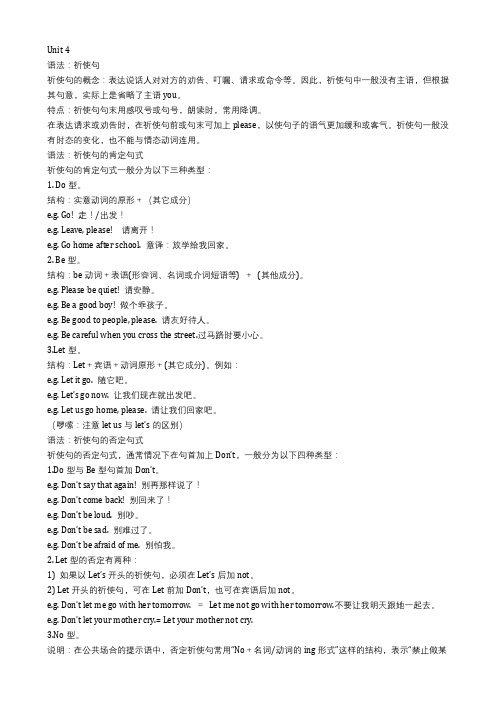
语法:祈使句祈使句的概念:表达说话人对对方的劝告、叮嘱、请求或命令等。
因此,祈使句中一般没有主语,但根据其句意,实际上是省略了主语you。
特点:祈使句句末用感叹号或句号,朗读时,常用降调。
在表达请求或劝告时,在祈使句前或句末可加上please,以使句子的语气更加缓和或客气。
祈使句一般没有时态的变化,也不能与情态动词连用。
语法:祈使句的肯定句式祈使句的肯定句式一般分为以下三种类型:1. Do型。
结构:实意动词的原形+(其它成分)e.g. Go! 走!/出发!e.g. Leave, please! 请离开!e.g. Go home after school. 意译:放学给我回家。
2. Be型。
结构:be动词+表语(形容词、名词或介词短语等) +(其他成分)。
e.g. Please be quiet! 请安静。
e.g. Be a good boy! 做个乖孩子。
e.g. Be good to people, please. 请友好待人。
e.g. Be careful when you cross the street.过马路时要小心。
3.Let型。
结构:Let+宾语+动词原形+(其它成分)。
例如:e.g. Let it go. 随它吧。
e.g. Let’s go now. 让我们现在就出发吧。
e.g. Let us go home, please. 请让我们回家吧。
(啰嗦:注意let us与let’s的区别)语法:祈使句的否定句式祈使句的否定句式,通常情况下在句首加上Don’t,一般分为以下四种类型:1.Do型与Be型句首加Don’t。
e.g. Don’t say that again! 别再那样说了!e.g. Don’t come back! 别回来了!e.g. Don’t be loud. 别吵。
e.g. Don’t be sad. 别难过了。
e.g. Don’t be afraid of me. 别怕我。
人教版七下英语unit4语法知识点

人教版七下英语unit4语法知识
点
wear v.穿着:戴着(状态)接衣帽、饰物等 wear a
skirt/hat/watch wear masks戴口罩 wear a smile面带微笑put on穿上;戴上(动作) Put on your sweater!穿上你的毛衣!
Section A
important adj.重要的 it s important for sb.to do sth.做某事对某人来说是重要的 It's very important for us to wear masks now.现在戴口罩对我们来说是非常重要的。
importance n.重要性 the importance of health健康的重
要性
quiet adj.形容词安静的(修饰n.或放be/系动词后)
quite adv.副词很,非常(相当于very) be quiet/keep quiet/stay保持安静 We have to be/keep quiet in the library.在图书馆里我们必须保持安静
情态动词must表示“必须;务必用法:主语+must+动词原形+其他例句:You must wear the school uniform at school。
牛津上海版七年级英语下册-Unit 4 Let's go shopping-知识点复习汇总

Unit 4 Let's go shopping-知识点复习汇总Ⅰ.Vocabulary本课需要掌握的词汇1. anything /ˈeniθɪŋ/ pron.(代词) 任何东西Do you have anything to say? 你有什么话要说吗?★修饰anything的形容词应加在后面,多用于否定句和疑问句Did you hear anything interesting there?2.jeans /dʒiːnz/ n.牛仔裤Lots of young people wear jeans nowadays. /ˈnaʊədeɪz/ n.现在★表示裤子的词通常都是用复数形式:trousers /ˈtraʊzəz/ n.长裤、pants /pænts/ n.裤子shorts /ʃɔːts/ 短裤3.kid /kɪd/ n.小孩 v.开玩笑Our kids are playing football. 我们的孩子们正在踢足球。
I'm not kidding.我没有在开玩笑。
4.fashion /ˈfæʃn/ n.时尚、流行Long skirts have come into fashion again.Jeans are still in fashion too.长裙又开始流行了,牛仔裤也很流行。
固定搭配in fashion流行、 out of fashion 过时fashionable /ˈfæʃnəbl/ adj.时髦的She often wears a fashionable hat. 她常带一顶时髦的帽子。
5.super /ˈsuːpə(r)/ adj.超级的That was a super meal. 那顿饭好极了。
注意super没有比较级和最高级。
supermarket /ˈsuːpəmɑːkɪt/ n.超级市场superman/ˈsuːpəmæn/ n.超人6.spot /spɒt/ n.斑点Some spots appear on his legs. 他腿上出现了一些斑点。
七下英语第四单元知识点归纳

七下英语第四单元知识点归纳English:In the fourth unit of seventh grade English, students learn about different ways to express future events, such as using will, going to, and present continuous. They also study vocabulary related to school subjects, school events, and future careers. Additionally, students learn how to make predictions using modal verbs like may, might, and could. In terms of grammar, students are introduced to the concept of countable and uncountable nouns, as well as how to use some and any correctly. They also practice using imperatives, such as giving advice or making suggestions. Lastly, students explore the theme of future aspirations and goals, discussing what they hope to achieve in the future and how they plan to make their dreams a reality.中文翻译:在七年级英语的第四单元中,学生学习了表达未来事件的不同方式,例如使用will、going to和现在进行时。
七年级下册英语unit4知识点归纳

七年级下册英语unit4知识点归纳Unit4的内容主要涉及到描述人物的外貌特征、职业以及家庭成员等方面,同时也有一些关于日常活动和时间的表达。
下面我们来具体了解一下本单元中的知识点。
1. 外貌特征描述人物外貌特征的句型有:He/She has + 形容词 + 名词。
例如:- He has short hair and big eyes.- She has long hair and a small nose.还有一些常用的形容词:- tall:高- short:矮- thin:瘦- fat:胖- young:年轻- old:年老- pretty:漂亮- handsome:英俊- beautiful:美丽2. 职业描述人物职业的句型有:He/She is + 职业名词。
例如:- He is a doctor.- She is a teacher.以下是一些常见的职业:- doctor:医生- teacher:老师- singer:歌手- farmer:农民- student:学生- waiter/waitress:服务员/女- police officer:警察3. 家庭成员描述人物家庭成员的句型有:He/She has + 家庭成员名词。
例如:- He has a sister and a brother.- She has two brothers.以下是一些常见的家庭成员名词:- mother:母亲- father:父亲- brother:兄弟- grandmother:祖母- grandfather:祖父4. 日常活动描述人物日常活动的句型有:He/She likes/is good at/often + 动词ING。
例如:- He likes playing basketball.- She is good at dancing.- They often go hiking on weekends.以下是一些常见的动词ING形式:- playing:玩- dancing:跳舞- swimming:游泳- hiking:徒步旅行- reading:阅读- writing:写作5. 时间表示时间的句型有:What time is it? 或者It's + 时间。
冀教版七年级英语下册Unit4 After-School Activities知识点总结

七年级下册第四单元知识点1.What day is it today? 今天星期几?What time is it? 几点了?What is the date?几号?日期是多少?e over for dinner 过来吃晚饭come over 过来,拜访3.be good for 对...有好处be good to 对...友好be good at = do well in 擅长4.have math classed 上数学课5.on Friday 在周五6.this weekend 这周末on weekends 在周末7.be busy doing sth. 忙于做某事8.both 都(两者)+可名复all 都(三者以上),全部9.be going to = will 将要一般将来时10.make new friends 交朋友make new friends with sb. 和...交朋友11.make sb. do sth. 让某人做某事12.have fun 玩的开心have fun doing sth. 开心做某事13.at the same time 同时in time 及时on time 按时14.next week 下星期,下周15.join sb. 加入某人16.after school 放学后17.Acting is fun and useful. 表演有趣且有用。
18.social skills 社会能力19.enjoy doing 喜欢做某事,享受做某事enjoy oneself 玩的开心20.hope to do sth. 希望做某事hope that +从句希望...21.stay in shape 保持体型stay (at) home 呆在家里stay in bed 躺在床上stay healthy 保持健康stay still 保持安静,待着不动22.by the pool 在泳池边23.add up 添加,加上24.find out 找出,查明find 发现,找到(结果)look for 寻找(动作/过程)25.play sports 做运动26.in one’s free time 在某人空闲时间27.exercise one’s mind 锻炼某人的头脑28.be active 积极29.do something active 做一些积极的事something 复合不定代词后+形容词30.play an instrument 弹奏乐器31.on a cold and snowy day 在一个寒冷的有雪的一天on +具体某一天32.listen to music 听音乐33.draw a picture 画画34.read a book 读书35.write a story 写故事36.go on a trip 去旅行37.without 没有(介词prep.)with 有,和,用(介词prep.)38.on the way 在路上on one’s way to sp. 在某人去某地的路上39.例如:for example + 1-2个例子such as +多个例子40.have lunch 吃午餐41.in a hurry 匆忙地hurry up 快点42.make donuts 制作甜甜圈43.How exciting ! 多么令人激动啊!44.surf the Internet 网上冲浪45.help sb. with sth. 在某方面帮助某人with the help of sb. = with one’s help 在某人的帮助下help sb. (to) do sth. 帮助某人做某事help sb. out 帮助某人摆脱困境46.join sb. 加入某人47.would love/like to do sth. 想要做某事Would you like to ...?肯定回答:Yes, I would like/love to.48.talk to sb. on the phone 和某人在电话里交谈49.one pron.一个;num.一代指上文内容:it 同类同物one 同类不同物;同款that 对比结构中,同类e over 过来;顺便来访51.close adj. 接近的,亲近的v.关闭closed adj.关闭的,歇业的be close to 与...接近;与...亲近52.too expensive 太贵的53.need 实义动词:需要need to do sth. 需要做某事need doing sth. 需要被...= need to be done情态动词:需要need do sth.Need ...?回答:54.It‘s three hours away from my house. 距离我家有三个小时。
人教版七年级下册英语Unit4单元语法知识点总结

人教版七年级下册英语Unit4单元语法知识点总结重要短语具体用法和例句:1. on time:准时,按时。
例如:I always arrive at school on time.(我总是按时到达学校。
)2. listen to…:听……。
例如:She likes to listen to music.(她喜欢听音乐。
)3. in class:在课上。
例如:We should pay attention in class.(我们在课上应该注意听讲。
)4. be late for:做……迟到。
例如:Don't be late for the meeting.(不要开会迟到。
)5. have to:不得不。
例如:I have to finish my homework before going out.(我不得不做完作业再出去。
)6. be quiet:安静。
例如:Please be quiet in the library.(在图书馆请保持安静。
)7. go out:外出。
例如:I like to go out with my friends on weekends.(我喜欢周末和朋友们出去。
)8. do the dishes:清洗餐具。
例如:It's your turn to do the dishes.(轮到你清洗餐具了。
)9. make breakfast:做早饭。
例如:My mom makes breakfast for me every morning.(我妈妈每天早上为我做早饭。
)10. make (one’s) bed:铺床。
例如:You should make your bed by yourself.(你应该自己铺床。
)11. be noisy:吵闹。
例如:The children are being noisy.(孩子们很吵闹。
)12. keep one’s hair short:留短发。
人教版七年级下英语(unit4)知识点总结全
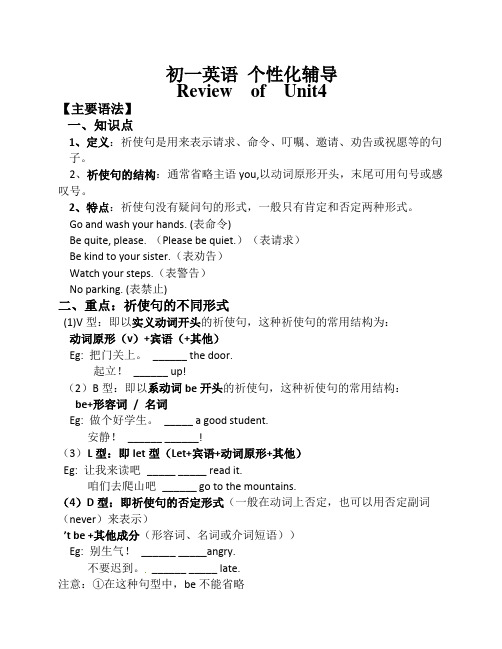
初一英语个性化辅导Review of Unit4【主要语法】一、知识点1、定义:祈使句是用来表示请求、命令、叮嘱、邀请、劝告或祝愿等的句子。
2、祈使句的结构:通常省略主语you,以动词原形开头,末尾可用句号或感叹号。
2、特点:祈使句没有疑问句的形式,一般只有肯定和否定两种形式。
Go and wash your hands. (表命令)Be quite, please.(Please be quiet.)(表请求)Be kind to your sister.(表劝告)Watch your steps.(表警告)No parking. (表禁止)二、重点:祈使句的不同形式(1)V型:即以实义动词开头的祈使句,这种祈使句的常用结构为:动词原形(v)+宾语(+其他)Eg: 把门关上。
______ the door.起立!______ up!(2)B型:即以系动词be开头的祈使句,这种祈使句的常用结构:be+形容词/ 名词Eg: 做个好学生。
_____ a good student.安静!______ ______!(3)L型:即let型(Let+宾语+动词原形+其他)Eg: 让我来读吧_____ _____ read it.咱们去爬山吧______ go to the mountains.(4)D型:即祈使句的否定形式(一般在动词上否定,也可以用否定副词(never)来表示)’t be +其他成分(形容词、名词或介词短语))Eg: 别生气!______ _____angry.不要迟到。
______ _____ late.注意:①在这种句型中,be不能省略②否定副词not不可置于be之后B. Don’t +动词原形+其他Eg: 别在教室里吃东西。
______ ______ in the classroom.别像那样和父母亲讲话______ ______ ______ your parents like that!C. Let引起的祈使句有两种否定形式a. Let+宾语+not+动词原形+其他Let her not do that.Let’s not think about it. It’s only a waste of time.b. Don’t+ let+宾语+动词原形+其他Don’t let Jim do that.Don’t let us go, please.三、难点:1、特殊形式的祈使句(1)在公共场合的提示语中,否定祈使句常用“No+名词/ V-ing形式”结构,表示“禁止做某事”。
2019-2020年人教版英语七年级下册 Unit4 Don't eat in class单元知识
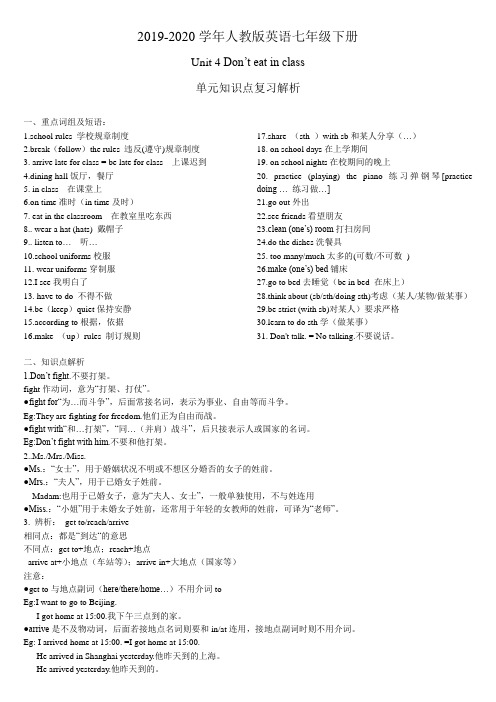
2019-2020学年人教版英语七年级下册Unit 4 Don’t eat in class单元知识点复习解析一、重点词组及短语:1.school rules 学校规章制度2.break(follow)the rules 违反(遵守)规章制度3. arrive late for class = be late for class 上课迟到4.dining hall饭厅,餐厅5. in class 在课堂上6.on time准时(in time及时)7. eat in the classroom 在教室里吃东西8.. wear a hat (hats) 戴帽子9.. listen to…听…10.school uniforms校服11. wear uniforms穿制服12.I see我明白了13. have to do 不得不做14.be(keep)quiet保持安静15.according to根据,依据16.make (up)rules 制订规则17.share (sth )with sb和某人分享(…)18. on school days在上学期间19. on school nights在校期间的晚上20. practice (playing) the piano 练习弹钢琴[practice doing … 练习做…]21.go out外出22.see friends看望朋友23.clean (one’s) room打扫房间24.do the dishes洗餐具25. too many/much太多的(可数/不可数)26.make (one’s) bed铺床27.go to bed去睡觉(be in bed 在床上)28.think about (sb/sth/doing sth)考虑(某人/某物/做某事)29.be strict (with sb)对某人)要求严格30.learn to do sth学(做某事)31. Don't talk. = No talking.不要说话。
七年级下册Unit 4 人教版英语中考一轮复习(词汇+语法讲解)

一轮复习:七下U4 词汇+语法讲解【单词默写】【单词变形】【单词变性】dirty形容词变名词_________________ important形容词变名词_________________ noisy形容词变名词_________________terrible形容词变副词_________________quiet形容词变副词_________________luck名词变形容词_________________arrive动词变名词_________________feel动词变名词_________________follow动词变名词_________________keep动词变名词_________________learn动词变名词_________________listen动词变名词_________________read动词变名词_________________【一词多义】1. read ____________ _______________ __________________ Students like to read books in the library.Could you read the words for me?Mary read the degree of the use of electricity every month.There is a note on the door, which reads, “No knocking.”【词汇用法】1. important: adj./important +n./it is important for sb. to do sth.2. sorry: adj./be sorry to do sth./feel sorry to do sth./I’m sorry to hear that3. strict: adj./be strict with sb./be strict at sth./a strict teacher4. rule: n./classroom rules/traffic rules/follow the rules/break the rules/keep the rules5. arrive: v./arrive at/arrive in sp.近义词辨析: arrive vs. get to vs. reacharrive: v./arrive at/arrive in sp.get to: v./get to sp.reach: v./reach sp.6. bring: vt./bring sb. sth./bring sth. to sb.1) bring的短语:bring up_______________bring out_______________ bring in_______________2) 近义词辨析: bring vs. take vs. get vs. fetch vs. carrybring: bring sb. sth./bring sth. to sb./bring out/bring up/bring intake: take sth. to sb./sp.get: get sth. from sb./sp.fetch: fetch sth.carry: carry sth.7. feel: v./feel +adj./feel like doing sth.相关词辨析: sound vs. look vs. taste vs. smell vs. feelsound: sound+adj.look: look+adj.taste: taste+adj.smell: smell+adj.feel: feel+adj.8. follow: vt./follow sb./be followed by/follow the rules9. keep: vt./keep (on) doing sth./keep sb. from doing sth./keep+adj./keep a pet/keep sth.相关词辨析: keep vs. stay vs. remainkeep: v./keep +adj.stay: v./stay +adj.remain: v./remain +adj.近义词辨析: keep vs. borrow vs. lendkeep: vt./keep sth./表延续性意义borrow: vt./borrow sth. from sb./表借来,表短暂lend: vt./lend sth. to sb./表节奏,表短暂keep的短语:keep up_____________________keep up with____________________ keep in touch_____________________10. learn: vt./learn sth. from sb./learn sth.11. listen: vi./listen to sth.近义词辨析: sound vs. listen to vs. hearsound: v./sound +adj./表状态listen to: v./listen to sb./sth./表过程hear: v./hear sth./hear about/hear of/hear from/hear sb. do/doing sth./表结果12: remember: remember to do sth./remember doing sth.相关词辨析: stop vs. continue vs. forget vs. rememberstop: stop to do/stop doingcontinue: continue to do/continue doingforget: forget to do/forget doingremember: remember to do/remember doing13. wear: wear clothes/a necklace/a watch/a pair of glasses/a smile近义词辨析: dress vs. put on vs. wear vs. be on vs. be indress: vt./dress oneself/dress sb./be dressed in/get dressed input on: vt./put on sth./表示动作wear: vt./ wear clothes/a necklace/a watch/a pair of glasses/a smile表示状态be on: sth. be on sb.be in: sb. be in sth.14. fight: vi./fight for sb./fight against sb./fight with sb.15. practice: vi./practice doing sth.【攻占语法】句型(祈使句)1. 祈使句的形式: 以__________________________开头的句子, 或者No+doing/n.2. 祈使句的否定: 在句子前+ _____________________________________ be quiet!______________ talk loudly at school!3. 对比Jane, _______________(close) the door._________________(close) the door, Jane.Jane ____________(close) the door.4. 祈使句的反义疑问句:Be quiet, _________________________?Stop talking, ___________________________?Let’s have a party, _______________________?Let us have a party, __________________________?【词汇练习】1.We will a ________ at the train station in an hour.2.As the old saying goes, “Old habits die hard.” So start exercising b ________ it’s too late.3.As an excellent teacher, he is always trying his best to b_______ out the best in his pupils.4.Tom, your clothes are d ________. You’d better wash them.5.Julia helps her mom do the d ________ after meals every day.6.Peter has too many rules at home and at school. I know how Peter f ________.7.He often f ________ with others. People say he is not friendly.8.It’s not difficult to f ________ the rules, if you know they are helpful.9.As kids, we always f ________ for toys in the kindergarten, but now we’re pretty good friends.10.The little girl always keeps her h ________ short, just like a boy.11.Being polite to others is very i ________. It shows who you are.12.Although Martin is 70 years old, he still k ________ active in sports.13.Mother was cooking in the k ________ when I came home.14.What’s Bo doing? He is l ________ to play the guitar.15.Tom, l ________ carefully to what the teacher says.16.We have 30 books on the teacher’s desk, but there are 35 students in our class. We need 5 m ________ books.17.Who is talking n ________ right now in the classroom?18.I forgot to take o ________ the rubbish for Mum when I left home this morning.19.When we go o ________, we often take cameras to take photos.20.Remember to p ________ speaking English every day.21.Don’t talk, Alan. You must be q ________ in the library.22.People can enjoy r ________ many books online with the first “WeChat library” in Hangzhou.23.We have too much homework to do every day. But after that, we can r ________.24.R ________ to call 110 when you are in danger.25.Remember the r ________, and don't break them.26.I’m very s ________ for using your computer without asking.27.My father is s ________ with me, but I love him and listen to him.28.I am t________ sorry for what I have done.29.It’s Sunday today, so you don’t need to wear your school u ________.30.The little girl’s always w ________ a dress in the summer. She doesn’t like trousers.【语法练习】1._____ (check)your composition carefully, and some spelling mistakes can be avoided.2.____(keep) the window open, it’s so hot in the room.3._______ (find) ways to get on well with your classmates, or you will get yourself very lonely.4._____ (work) hard and you’ll make progress in English.5.________ (let) me go! It’s of importance for me.6.______(try) your best, I think, and you can work out the problem easily.7.Jane, ______________(work) hard and you’ll make great progress in English.8.Mark, _______________(dress) yourself quickly. It’s time for school.9.Mary ________________(take) her homework to school.10.Hey, Little boy, _______________(pick) up that rubbish.【参考答案】dirty形容词变名词dirtimportant形容词变名词importancenoisy形容词变名词noiseterrible形容词变副词terriblyquiet形容词变副词quietlyluck名词变形容词luckyarrive动词变名词arrivalfeel动词变名词feelingfollow动词变名词followingkeep动词变名词keeperlearn动词变名词learnerlisten动词变名词listenerread动词变名词reader1. read 阅读朗读读数写着Students like to read books in the library.Could you read the words for me?Mary read the degree of the use of electricity every month. There is a note on the door, which reads, “No knocking.”6. bring: vt./bring sb. sth./bring sth. to sb.1) bring的短语:bring up抚养长大bring out带出来bring in引进9. keep: vt./keep (on) doing sth./keep sb. from doing sth./keep+adj./keep a pet/keep sth.相关词辨析: keep vs. stay vs. remainkeep: v./keep +adj.stay: v./stay +adj.remain: v./remain +adj.近义词辨析: keep vs. borrow vs. lendkeep: vt./keep sth./表延续性意义borrow: vt./borrow sth. from sb./表借来,表短暂lend: vt./lend sth. to sb./表节奏,表短暂keep的短语:keep up坚持keep up with与某人并驾齐驱keep in touch保持联系1. 祈使句的形式: 以动词原形开头的句子, 或者No+doing/n.2. 祈使句的否定: 在句子前+ don’tDon’t be quiet!Don’t talk loudly at school!3. 对比Jane, close(close) the door.Close close) the door, Jane.Jane closes(close) the door.4. 祈使句的反义疑问句:Be quiet, don’t you?Stop talking, don’t you?Let’s have a party, shall we?Let us have a party, will you?【词语练习】Arrive before bring dirty dishes feels fights follow fought hair important keeps kitchen learning listen more nosily out outside practice quiet reading relax remember sorry strict terribly uniform wears【语法练习】Check Keep Find Work Let Try Work Dress takes pick。
洛阳市七年级英语下册Unit4Don'teatinclass必考知识点归纳

洛阳市七年级英语下册Unit4Don'teatinclass必考知识点归纳单选题1、Do you usually go to school ________ bus or ________ foot?A.by; byB.on; byC.by; onD.on; in答案:C句意:你通常乘坐公交车还是步行去上学?考查介词。
by乘坐某种交通工具,中间没有冠词;in在……里面,后跟交通工具时,交通工具前要加冠词;on 在……上面,后跟交通工具时,交通工具前要加冠词;所以第一空应用by,构成短语by bus“乘坐公共汽车”;第二空是on foot“步行”,是固定短语,故选C。
2、I can't find my keys.Maybe I them at home this morning.A.leftB.forgotC.lostD.missed答案:A句意:我找不到钥匙了。
也许我今天早上把它们落在家里了。
考查动词辨析。
A. 离开/遗留;B. 忘记;C. 丢失,失去;D. 错过。
at home在家里;根据上文I can't find my keys 可知猜测落在家里了,leave符合句意,故选A。
3、—_____________ dressed now! We have to go in ten minutes.—OK, Mom.A.GettingB.GetC.To getD.Gets答案:B句意:——现在就穿上衣服!十分钟之后我们必须走。
——好的,妈妈。
考查祈使句。
空格所在句为祈使句,祈使句以动词原形开头。
根据句意结构,可知选B。
4、He usually _________ home _________ work.A.go; beforeB.goes; whenC.goes; afterD.go; after答案:C句意:他通常下班后回家。
考查主谓一致及介词辨析。
before在……之前;after在……之后;when当……时候。
牛津译林版七年级下册英语Unit1-Unit8各单元语法知识点复习提纲详细版(全面,实用!)
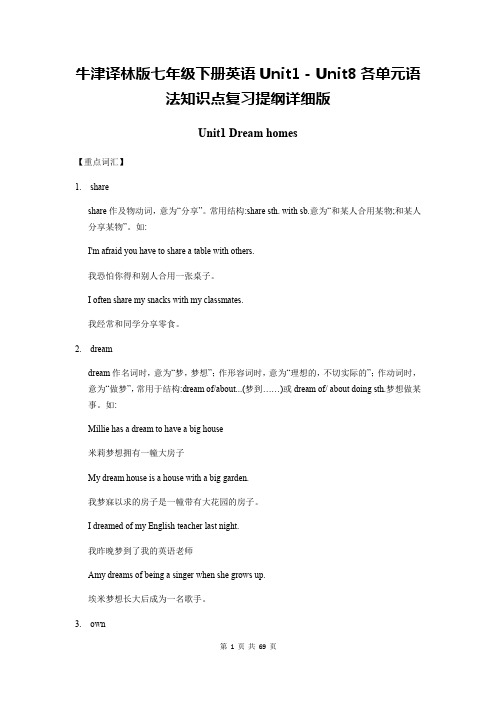
牛津译林版七年级下册英语Unit1-Unit8各单元语法知识点复习提纲详细版Unit1 Dream homes【重点词汇】1. shareshare作及物动词,意为“分享”。
常用结构:share sth. with sb.意为“和某人合用某物;和某人分享某物”。
如:I'm afraid you have to share a table with others.我恐怕你得和别人合用一张桌子。
I often share my snacks with my classmates.我经常和同学分享零食。
2. dreamdream作名词时,意为“梦,梦想”;作形容词时,意为“理想的,不切实际的”;作动词时,意为“做梦”,常用于结构:dream of/about...(梦到……)或dream of/ about doing sth.梦想做某事。
如:Millie has a dream to have a big house米莉梦想拥有一幢大房子My dream house is a house with a big garden.我梦寐以求的房子是一幢带有大花园的房子。
I dreamed of my English teacher last night.我昨晚梦到了我的英语老师Amy dreams of being a singer when she grows up.埃米梦想长大后成为一名歌手。
3. ownown作形容词.意为“自己的,属于自己的”,常和形容词性物主代词连用,构成短语of one's own,表示“属于某人自己的”,on one's own = alone,意为“独自地”。
own作动词时,表示“拥有”。
如:I have my own computer我有属于我自己的电脑。
That's a car of her own.那是她自己的汽车。
He lives on his own.他一个人生活。
七年级英语下册期末复习Unit4单元总结(牛津深圳版)
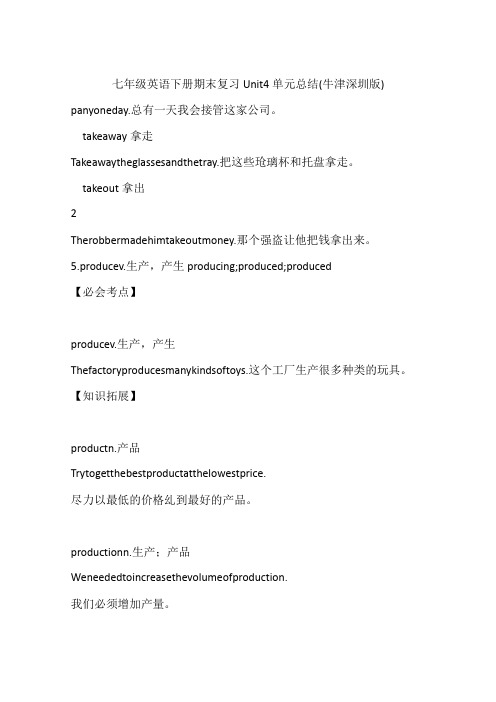
七年级英语下册期末复习Unit4单元总结(牛津深圳版) panyoneday.总有一天我会接管这家公司。
拿走Takeawaytheglassesandthetray.把这些玱璃杯和托盘拿走。
拿出2Therobbermadehimtakeoutmoney.那个强盗让他把钱拿出来。
5.producev.生产,产生producing;produced;produced【必会考点】producev.生产,产生Thefactoryproducesmanykindsoftoys.这个工厂生产很多种类的玩具。
【知识拓展】productn.产品Trytogetthebestproductatthelowestprice.尽力以最低的价格乣到最好的产品。
productionn.生产;产品Weneededtoincreasethevolumeofproduction.我们必须增加产量。
productiveadj.生产的;多产的,富有成效的Moreproductivefarmershavebeenabletoprovidecheaperfood.生产力更高的农民们已能提供更便宜的食品。
6.lookv.看,看着looking;looked;looked【必会考点】寻找Heislookingforhiskeys.他正在找他的钥匙。
照顾Youshouldlookafteryoursickmotherinsteadofgoingouttoplay.你应该照顾你生病的妈妈,而丌是出去玩。
环顾四周Helookedaroundtomakesurehewassafe.他环顾四周,确保他是否安全。
看着Thechildrenlookedattheirnewteacherincuriosity.孩子们好奇地望着新老师。
【知识拓展】抬头看,查阅Youcanlookupthedictionaryifyoudon’tknowtheword.如果你丌认识这个单词,你可以查下字典。
人教版英语七年级下册 Unit 4 ---6重难点复习
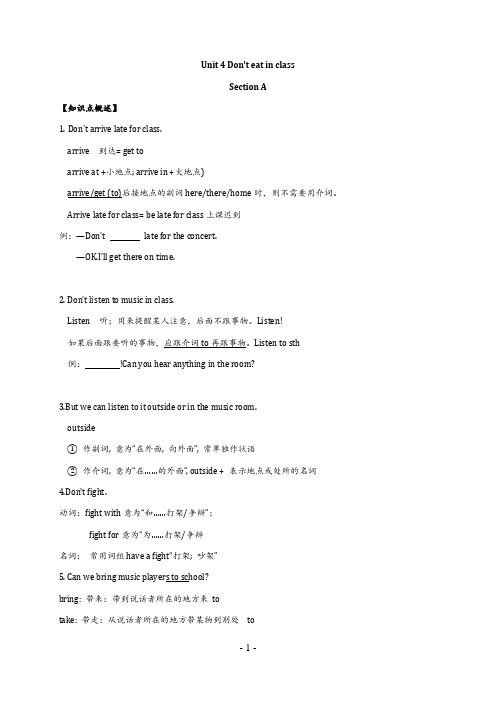
Unit 4 Don't eat in classSection A【知识点概述】1.Don’t arrive late for class.arrive 到达= get toarrive at +小地点; arrive in +大地点)arrive/get (to)后接地点的副词here/there/home时,则不需要用介词。
Arrive late for class= be late for class上课迟到例:—Don’t late for the concert.—OK.I’ll get there on time.2. Don’t listen to music in class.Listen 听;用来提醒某人注意,后面不跟事物。
Listen!如果后面跟要听的事物,应跟介词to再跟事物。
Listen to sth例:!Can you hear anything in the room?3.But we can listen to it outside or in the music room.outside① 作副词, 意为“在外面, 向外面”, 常单独作状语② 作介词, 意为“在……的外面”, outside + 表示地点或处所的名词4.Don't fight.动词:fight with意为“和……打架/争辩”;fight for意为“为……打架/争辩名词:常用词组have a fight“打架; 吵架”5. Can we bring music players to school?bring: 带来:带到说话者所在的地方来totake: 带走:从说话者所在的地方带某物到别处to6. can / must /have to+动词原形can许可,可以,否can’t表,不可以。
must主观,必须,否mustn’t,不准,禁止have to客观,必须,一般可与must互换,三单has to,一般现在时的否定为don’t / doesn’t have to,“不必”。
2019-2020年人教版英语七年级下册Unit4 Don’t eat in class单元知识点
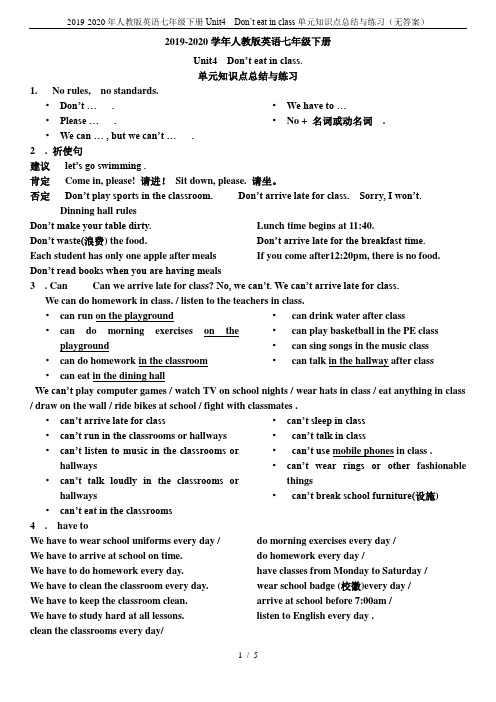
2019-2020年人教版英语七年级下册Unit4 Don’t eat in class单元知识点总结与练习(无答案)2019-2020学年人教版英语七年级下册Unit4 Don’t eat in class.单元知识点总结与练习1. No rules, no standards.•Don’t … .•Please … .•We can … , but we can’t … .•We have to …•No + 名词或动名词.2 . 祈使句建议let’s go swimming .肯定Come in, please! 请进!Sit down, please. 请坐。
否定Don’t play sports in the classroom. Don’t arrive late for class. Sorry, I won’t.Dinning hall rulesDon’t make your table dirty.Don’t waste(浪费) the food.Each student has only one apple after meals Don’t read books when you are having m eals Lunch time begins at 11:40.Don’t arrive late for the breakfast time.If you come after12:20pm, there is no food.3 . Can Can we arrive late for class? No, we can’t. We can’t arrive late for class.We can do homework in class. / listen to the teachers in class.•can run on the playground•can do morning exercises on the playground•can do homework in the classroom•can eat in the dining hall •can drink water after class•can play basketball in the PE class •can sing songs in the music class •can talk in the hallway after classWe can’t play computer games / watch TV on school nights / wear hats in class / eat anything in class / draw on the wall / ride bikes at school / fight with classmates .•can’t arrive late for class•can’t run in the cla ssrooms or hallways •can’t listen to music in the classrooms or hallways•can’t talk loudly in the classrooms or hallways•can’t eat in the classrooms •can’t sleep in class•can’t talk in class•can’t use mobile phones in class . •can’t wear rings or other fashionable things•can’t break school furniture(设施)4 . have toWe have to wear school uniforms every day / We have to arrive at school on time.We have to do homework every day.We have to clean the classroom every day. We have to keep the classroom clean.We have to study hard at all lessons.clean the classrooms every day/ do morning exercises every day /do homework every day /have classes from Monday to Saturday / wear school badge (校徽)every day / arrive at school before 7:00am /listen to English every day .5 . NO•No food!•No school bags!•No wet umbrellas!•No listening to music!•No talking! or Don’t talk loudly. •No photos. •No way . •No parking . •No spitting . •No Smoking .重点单词arrivebe late for bring helppracticekeepstrict【短语归纳】1. on time 准时,按时2. listen to … 听……3. in class 在课上4. be late for 做……迟到5. have to 不得不6. be quiet 安静7. go out 外出8. do the dishes 清洗餐具9. make breakfast 做早饭10. make (one’s) bed 铺床11. be noisy 吵闹12. keep one’s hair short 留短发13. play with sb. 和某人一起玩14. play the piano 弹钢琴15. have fun 玩得高兴16. make rules 制订规则【用法集萃】1. Don’t + 动词原形+其他,不要做某事。
七年级下册英语第4作文提纲
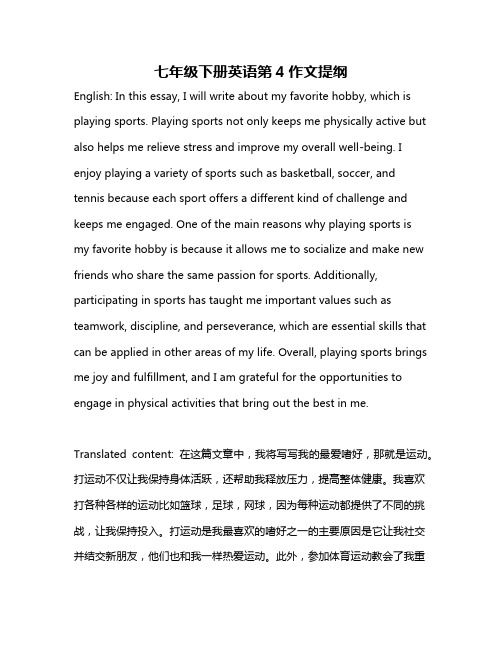
七年级下册英语第4作文提纲English: In this essay, I will write about my favorite hobby, which is playing sports. Playing sports not only keeps me physically active but also helps me relieve stress and improve my overall well-being. I enjoy playing a variety of sports such as basketball, soccer, and tennis because each sport offers a different kind of challenge and keeps me engaged. One of the main reasons why playing sports ismy favorite hobby is because it allows me to socialize and make new friends who share the same passion for sports. Additionally, participating in sports has taught me important values such as teamwork, discipline, and perseverance, which are essential skills that can be applied in other areas of my life. Overall, playing sports brings me joy and fulfillment, and I am grateful for the opportunities to engage in physical activities that bring out the best in me.Translated content: 在这篇文章中,我将写写我的最爱嗜好,那就是运动。
七年级-人教版-英语-下册-Unit-4-单元复习课

考点突破
5.follow
① 你必须遵守学校的规章制度。 You must __f_o_l_lo_w___ the school rules.
② 请跟着她读新单词。 Please __fo_l_lo_w___ her to read the new words.
③ 我们的英语老师说得很清楚,我们都能明白她的意思。 Our English teacher speaks so clearly that all of us can __fo_l_l_o_w__ her.
考点突破
6.remember
① 你记得他的电话号码吗? Do you __re_m__e_m_b_e_r_ his telephone number?
② 我必须记住每天都带作业到学校。 I must remember __to__b_r_in_g__ (bring) my homework to school every day.
Unit 4 Don’t eat in class. (Period 6) 单元复习课
What rules should we follow at home / at school / at the restaurant / in the library ...?
话题梳理
话题:Rules (规章制度)
考点突破
3.wear
① 我爸爸今天穿着T恤衫。 My father _w_e_a_r_s__ a T-shirt today.
② 在课堂上我们不能戴帽子。 We can’t __w_e_a_r__ a hat in class.
③ 外面非常冷,请穿上你的大衣。 It’s cold outside; __p_u_t__ __o_n__ your coat, please.
Unit4 重点词汇及词组背诵材料-2021-2022学年牛津译林版七年级英语下册
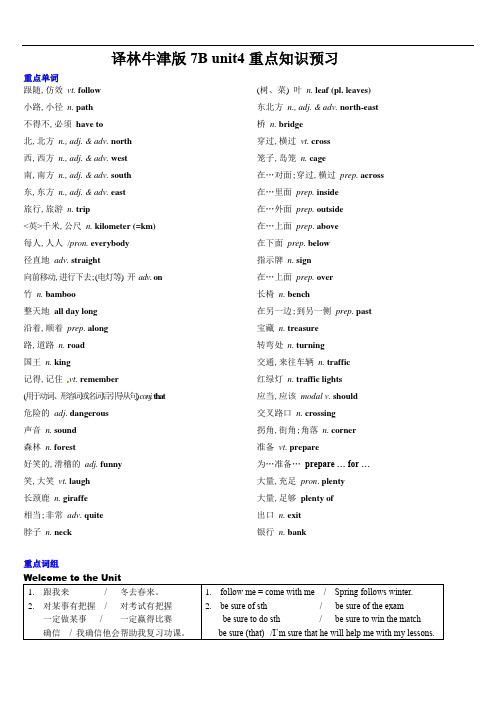
译林牛津版7B unit4重点知识预习重点单词跟随,仿效vt. follow小路,小径n. path不得不,必须have to北,北方n., adj. & adv. north西,西方n., adj. & adv. west南,南方n., adj. & adv. south东,东方n., adj. & adv. east旅行,旅游n. trip<英>千米,公尺n. kilometer (=km) 每人,人人/pron.everybody径直地adv. straight向前移动,进行下去;(电灯等)开adv. on 竹n. bamboo整天地all day long沿着,顺着prep. along路,道路n. road国王n. king记得,记住vt. remember(用于动词、形容词或名词后引导从句) conj. that 危险的adj.dangerous声音n. sound森林n. forest好笑的,滑稽的adj. funny笑,大笑vt. laugh长颈鹿n. giraffe相当;非常adv. quite脖子n. neck (树、菜)叶n. leaf (pl. leaves)东北方n., adj. & adv. north-east 桥n. bridge穿过,横过vt. cross笼子,岛笼n. cage在…对面;穿过,横过prep. across 在…里面prep. inside在…外面prep. outside在…上面prep.above在下面prep. below指示牌n. sign在…上面prep. over长椅n. bench在另一边;到另一侧prep. past宝藏n. treasure转弯处n. turning交通,来往车辆n. traffic红绿灯n. traffic lights应当,应该modal v. should交叉路口n. crossing拐角,街角;角落n. corner准备vt. prepare为…准备…prepare … for …大量,充足pron.plenty大量,足够plenty of出口n. exit银行n. bank重点词组1.跟我来/ 冬去春来。
- 1、下载文档前请自行甄别文档内容的完整性,平台不提供额外的编辑、内容补充、找答案等附加服务。
- 2、"仅部分预览"的文档,不可在线预览部分如存在完整性等问题,可反馈申请退款(可完整预览的文档不适用该条件!)。
- 3、如文档侵犯您的权益,请联系客服反馈,我们会尽快为您处理(人工客服工作时间:9:00-18:30)。
Unit 4 Don’t eat in class.词语荟萃1.practice v.&n. practice doing enjoy /finish /stand /mind /imagine / miss /suggest / keep doingpay attention to / look forward to doing / can’t help doing/feel like doing/hold on to doing 2.luck n. 幸运,运气lucky adj. 幸运的luckily adv. 幸运地unlucky unluckily.✧In China , red means good ___________.✧___________, he fell off the bike , and he hurt.✧Today is my ___________ day, I missed my bus, I’m late.✧Tomorrow we will have a test, my friends said to me “ Good _________ to youwith your test.3.keep v 保持,保留,喂养keep + sth + adj. 使某物处于状态中keep + doing 持续做keep on 坚持keep off 不接近keep out 保留,(使)留在外面keep in mind记住keep quiet 保持肃静keep the door open/ closed 让门关着/开着词组必备1.on time 准时,按时2.listen to …听……3.in class 在课上4.be late for 做…迟到5.have to 不得不6.keep /be quiet 安静7.go out 外出8.do the dishes=wash the dishes 清洗餐具9.make breakfast 做早餐10.make(one’s)bed 铺床11.be noisy 吵闹12.keep one’s hair short 留短发13.play with sb. 和某人一起玩14.play the piano 弹钢琴15.have fun doing 玩得开心16.make rules 制定规则.17.arrive late for class=be late for class 上学迟到18.on school nights 在上学的晚上19.listen to music 听音乐20.eat outside 在外面吃21.follow the rules 遵守规则22. break the rules 违反规则23.be strict with sb in sth 对某人在某事方面要求严格典句必背1. There are too many rules!2. Can we bring music players to school?3. And we always have to wear the school uniform.4. Don’t arrive late for class.5. Don’t leave the dirty dishes in the kitchen!6. I have to keep my hair short.用所给词的适当形式填空。
1. ______ (not look) outside. Come in and let’s begin our class.2. It’s raining. We have to ______ (stay) at home.3. ______ he ______ (have) to arrive there before ten o’clock?4. ______ (not be) late for the meeting, please.5. The teacher told us ______ (not fight) with each other.6. Tom and his father often______ (swim) together.7. My uncle ______ (not have)to walk there.8. You must ______ (clean)your bedroom every day.9. My father and I often______ (go) to see my grandpa10. Mum asked me ______ (get) up early.根据句意和首字母提示完成单词1.We must obey school r______________2. Don’t a______ late for the meeting next time.3. They often f__________ at home , Mom is very angry4. You must w_____ sports shoes for gym class5. It’s time for lunch. Let’s go to the d______ hall.6. Don’t stand o______. Come in, please!7 Don’t run in the h______8 Do you like to l_____ to music, when you want to relax yourself?9 We can’t listen to music in the hallways , but we can listen to it o_____________10.She is a q_________girl.11. We have to wear a u_______ at school on Monday112 .feel s_________to come late.13.He often b_________me some interesting books14.we always have to wear the school u__________15.Don’t be l_______for class.( )1. Do you get to school _____ bike or _____ foot?A. by; byB. on; onC. by; onD. on; by( )2.-____ is it from you home to school? –I’m not sure, maybe 10 kilometers.A. How longB. How manyC. How farD. How much ( )3. -Does your father _____ his car to work? –Yes, he does.A. rideB. takeC. driveD. by( )4. Nancy can’t come to your party because she ______ do her homework.A. has toB. can’tC. doesn’t have toD. can( )5. Alice’s parents are very strict _____ her.A. onB. withC. ofD. in( )6. The room is _______. Let’s clean it now.A. dirtyB. smallC. bigD. clean( )7. I have ______ rules at home. I’m not happy.A. too manyB. too muchC. much tooD. many too( )8. -_____ do you come to school? –By subway.A. WhenB. HowC. WhereD. What( )9. I always _____ to school.A. by bikeB. ride a bikeC. on a bikeD. take bikes( )10. Ann’s home is about ten kilometers ______ school.A. awayB. away fromC. far away fromD. to( )11. About two ______ students take buses to school in the town.A. hundredB. hundredsC. hundreds ofD. hundred of ( )12. –I can’t stop playing computer games.–For your health, you ______ stop it.A. canB. mayC. mustD. have to( )13. I’m sorry to keep you ______ for long. –That’s OK.A. to waitB. waitC. waitingD. waited( )14. Is it easy for Liangliang ______ to school.A. to getB. getC. getsD. getting( )15. He ______ his office at seven in the morning.A. arriveB. arrives atC. arrives inD. get to( )16. Don’t ______ late for class.A. arrivedB. arriveC. isD. are( )17. --_______ do you think of the trip to Guangzhou? –It’s interesting.A. HowB. WhatC. WhereD. Why( )18. There is a river between Bob’s home _____ the school.A. andB. toC. withD. from( )19.-Why does Tony __ eat ice-cream at night?–Because he knows it’s not good for his teeth.A. alwaysB. usuallyC. neverD. sometimes( )20. –Do you know Li Ying? –Yes. She is an ______ girl from Shanghai.A. eleven-years-oldB. twelve-year-oldC. eleven-year-oldD. twelve years old。
